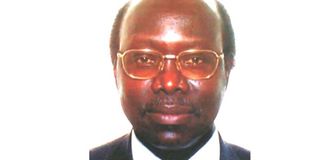Some reflections on the 2017/2018 Budget

Harold Acemah
What you need to know:
Two critical sectors get peanuts. Agriculture which employs almost 80 per cent of Ugandans gets a miserable 3.8 per cent of the Budget, i.e. Shs863.44 billion while tourism, trade and industry gets only Shs98.39 billion, despite the fact that tourism is a leading earner of foreign exchange for Uganda.
Estimates for the 2017/2018 National Budget were tabled in the Bunge or Parliament of Uganda on April 5 by State minister for Finance, David Bahati.
According to the minister, the Budget for the next financial year totals Shs28.9 trillion which is Shs2 trillion more than that of the 2016/2017 financial year which stands at Shs26.3 trillion.
The minister told the Bunge that Shs21 trillion would come from domestic sources while Shs7 trillion from external sources, such as, Uganda’s development partners who have been generous to Uganda for many years, but are growing weary because of endemic and systemic corruption.
Bahati assured Parliament that despite economic hardships, Uganda’s economy would bounce back and grow at 6.7 per cent due to several interventions, such as, reduced cost of electricity; investment in key infrastructures, especially in the oil sector; improvement in private sector competitiveness; export promotion and increased agricultural production.
I hope the minster is telling Ugandans the truth and not hoodwinking wananchi which is normal practice of NRM leaders.
Wrong priorities once again
According to the estimates, the priorities of the proposed Budget are as follows:
First, Works and Transport which has been allocated a record Shs4.6 trillion; this is the first time for a sector to get more than Shs4 trillion in one financial year. I am dismayed that a sector which is notorious for mega corruption has been given such a huge allocation.
Who can forget that Shs4 trillion was stolen at UNRA between 2008 and 2015 and nobody has been charged in court or held accountable! This anomaly makes one wonder why government continues to pour vast amounts of money into a leaking basket, unless the purpose is to enable the usual gluttons to feast and grow fat, as they have done for decades!
Second, energy and mineral development which was allocated Shs2.3 trillion. Third, education which gets Shs2.4 trillion which is far less than required for this key sector. Fourth, health which gets Shs1.8 trillion which is only 7 per cent of the Budget instead of 15 per cent as agreed by African leaders at the 2001 Abuja AU Summit.
Other significant allocations are public sector management - Shs1.4 trillion; justice, law and order sector – Shs1 trillion and accountability – Shs1 trillion.
Two critical sectors get peanuts. Agriculture which employs almost 80 per cent of Ugandans gets a miserable 3.8 per cent of the Budget, i.e. Shs863.44 billion while tourism, trade and industry gets only Shs98.39 billion, despite the fact that tourism is a leading earner of foreign exchange for Uganda.
With regard to the health sector, I concur with views expressed by US Ambassador Deborah Malac who made a passionate appeal to government in an opinion titled: “Without health, Uganda can’t achieve wealth” published in the Daily Monitor of April 7.
Ambassador Malac opines that: “President Museveni pledged in the 2001 Abuja Declaration to dedicate 15 per cent of the National Budget to health. Today that number stands at just 7 per cent but the government of Uganda’s proposed Budget for the next fiscal year recommends nearly a one-third cut for the Ministry of Health, plus reductions in other health areas and projects.”
Must it take the envoy of a development partner to state the obvious and urge government of Uganda to do the right thing for its own citizens? Is it too much to request government to double expenditure on the health sector in order to guarantee a prosperous future for Uganda?
The US ambassador continues to make this pertinent point. “But the Ugandan government now faces a crucial choice about the future of this country. Cutting health spending in favour of infrastructure projects jeopardises Uganda’s past decade of progress. It endangers the health of all Ugandans.” Who can disagree with that enlightened position?
If the ruling clique cares about all Ugandans, they should listen and make drastic and necessary changes in the proposed Budget before it is read in June.
One item which government does not want Ugandans to know and is hence often hidden is debt payment which is, in fact, the number one expenditure item which consumes a whopping Shs9.9 trillion or 34 per cent of the Budget! Considering that there is very little to show in terms of tangible benefits for citizens, Uganda’s debt burden is irresponsible, unsustainable and unacceptable!
Time to reset Uganda’s budget priorities
The message which Ugandans have for decades sent out clearly and loudly is that the priorities of our National Budget are three; quality education for all Ugandans, not UPE for goodness sake; quality and affordable healthcare for all Ugandans and finally significant investment in agriculture which is the backbone of Uganda’s economy. In my considered opinion, each of these three sectors should get at least 15 per cent of the Budget.
The Budget must not become a mere ritual or formality to deceive citizens and our development partners, but remain a strategic tool for national development.
Mr Acemah is a political scientist, consultant and a retired career diplomat. [email protected]




